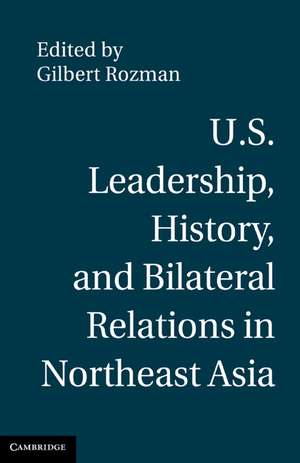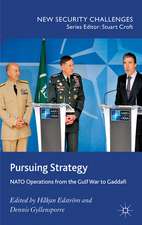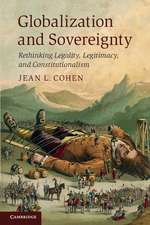U.S. Leadership, History, and Bilateral Relations in Northeast Asia
Editat de Gilbert Rozmanen Limba Engleză Hardback – 20 oct 2010
Preț: 438.08 lei
Preț vechi: 492.23 lei
-11% Nou
Puncte Express: 657
Preț estimativ în valută:
83.84€ • 87.19$ • 70.16£
83.84€ • 87.19$ • 70.16£
Carte tipărită la comandă
Livrare economică 15-29 martie
Preluare comenzi: 021 569.72.76
Specificații
ISBN-13: 9780521190565
ISBN-10: 0521190568
Pagini: 246
Ilustrații: 3 b/w illus. 1 table
Dimensiuni: 160 x 235 x 20 mm
Greutate: 0.54 kg
Editura: Cambridge University Press
Colecția Cambridge University Press
Locul publicării:New York, United States
ISBN-10: 0521190568
Pagini: 246
Ilustrații: 3 b/w illus. 1 table
Dimensiuni: 160 x 235 x 20 mm
Greutate: 0.54 kg
Editura: Cambridge University Press
Colecția Cambridge University Press
Locul publicării:New York, United States
Cuprins
1. Introduction Gilbert Rozman; Part I. Historical Memories and Bilateral Ties with Allies: 2. Japan's historical memory toward the United States Kazuhiko Togo; 3. Values and history in US-South Korean relations Gi-wook Shin; 4. US leadership, history, and relations with allies Gilbert Rozman; Part II. Historical Memories, Japanese-South Korean Relations, and US Values: 5. Japan-South Korea relations and the role of the United States on history Kazuhiko Togo; 6. Getting away or getting in?: US strategic options in the historical controversy between its allies Cheol Hee Park; 7. US strategic thinking on the Japanese-South Korean historical dispute Gilbert Rozman; Part III. Historical Memories, Sino-South Korean Relations, and US Values: 8. Sino-South Korean differences over Koguryo and the US role Jin Linbo; 9. New grounds for contestation: South Korea's Koguryo-era historical dramas and Sino-Korean relations Scott Snyder; 10. US strategic thinking on Sino-South Korean differences over history Gilbert Rozman.
Recenzii
“The role of history and memory in bilateral relations has lately become a big subject in the field. This volume goes much further by exploring the role of the United States in managing historical controversies between its allies (Japan and South Korea), as well as between an ally (South Korea) and a competitor (China). It is a must-read for anyone interested in ‘soft clashes’ in the region of East Asia.”
—Jae Ho Chung, Seoul National University
“This is an important book. The emergence of China as a great power and North Korea’s nuclear threat call for the need to create a stable multilateral international system in Northeast Asia. The triangular alliance among the United States, Japan, and South Korea bound by the common values of liberal democracy and capitalism should play a crucial role in this goal. But highly contested battles over historical memories have separated them, preventing them from forging a stable alliance. Focusing on three contentious battles—Japanese and south Korean memories against the United States, disagreements between Japan and South Korea, and the historical contention between China and South Korea over the ancient kingdom, Koguryo—the authors forcefully argue that the United States, which has avoided getting involved in the debate, is well-advised to confront the issues squarely, if a stable international system was to be established in the region.”
—Tsuyoshi Hasegawa, University of California, Santa Barbara
“An excellent contribution to the growing literature on how historical memory shapes the international politics of Northeast Asia. In an era of shifting regional power balances, this volume makes a compelling case for greater U.S. leadership in the process of historical reconciliation.”
—Mike Mochizuki, George Washington University
—Jae Ho Chung, Seoul National University
“This is an important book. The emergence of China as a great power and North Korea’s nuclear threat call for the need to create a stable multilateral international system in Northeast Asia. The triangular alliance among the United States, Japan, and South Korea bound by the common values of liberal democracy and capitalism should play a crucial role in this goal. But highly contested battles over historical memories have separated them, preventing them from forging a stable alliance. Focusing on three contentious battles—Japanese and south Korean memories against the United States, disagreements between Japan and South Korea, and the historical contention between China and South Korea over the ancient kingdom, Koguryo—the authors forcefully argue that the United States, which has avoided getting involved in the debate, is well-advised to confront the issues squarely, if a stable international system was to be established in the region.”
—Tsuyoshi Hasegawa, University of California, Santa Barbara
“An excellent contribution to the growing literature on how historical memory shapes the international politics of Northeast Asia. In an era of shifting regional power balances, this volume makes a compelling case for greater U.S. leadership in the process of historical reconciliation.”
—Mike Mochizuki, George Washington University
Descriere
This book explores the rising importance of history in reshaping international relations in Northeast Asia.

















